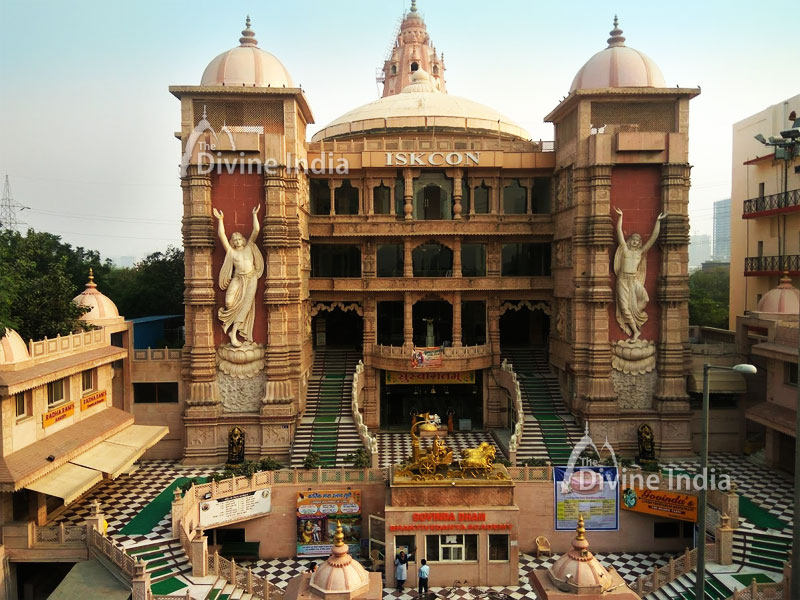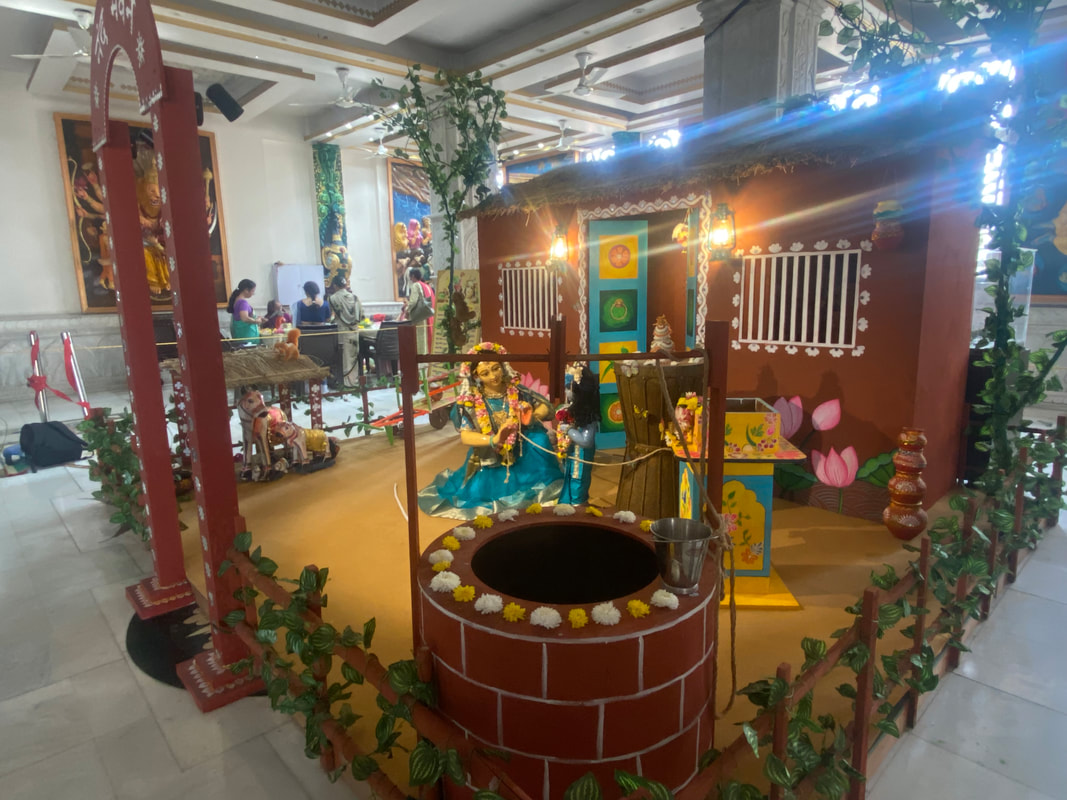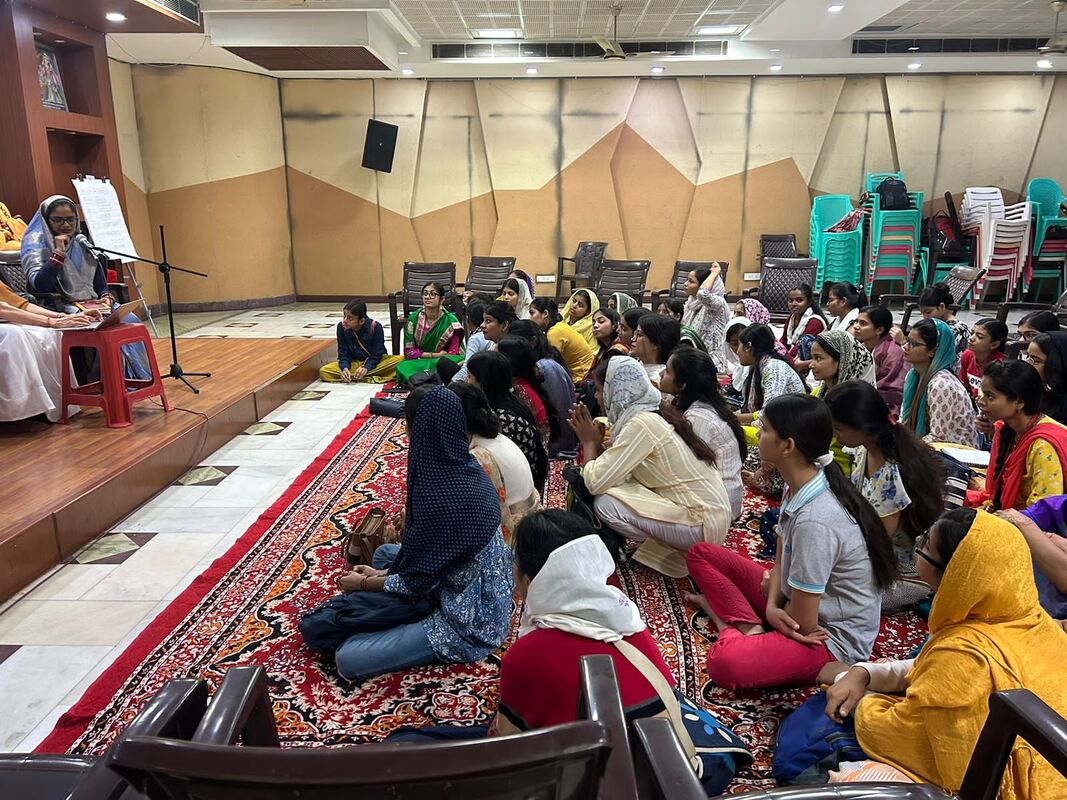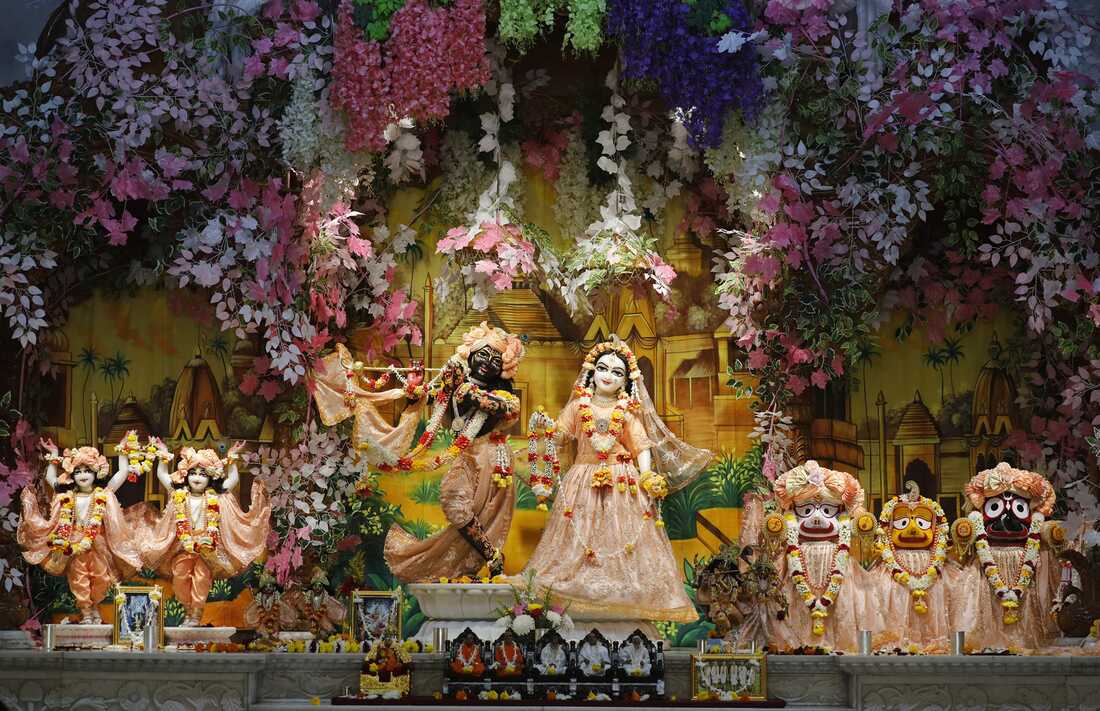Being the home base of HH Lokanath Maharaja, the temple shows a beautiful blend of contemporary and traditional architectural styles - it took 8 years to establish it and was opened to the public around 10 years ago.
For the month of Kartik, the devotees had created a nice diorama of mother Yashoda's courtyard and naughty Damodar in the temple room, with the grinding mortar, cows and other animals, a well and a tulasi mandap. Very creative and sweet, engaging our minds in remembering the famous pastime for one entire month...!
The mangal artiks were especially well attended during the month of kartik, and so was the singing of Damodarastakam in the evenings - everybody was eager to get the beautiful darshan of Their Lordships and offer a lamp with love and devotion.
A materialist will see such a beginning phase of a conjugal relationship as the most romantic time where both exchange sweet nothings – the whispered little endearments and flattering words that mean nothing, and at the same time, seem to mean so much; expressions such as: “You make me so happy!”, “I love you!”, “You’re the one”, “You really look good today”, “I’m so proud to be the one standing next to you!”.
Such exchanges will only lull us into emotional entanglement and blind us with rose-coloured glasses that will distort our vision. As devotees, we know very well that this will inhibit our ability to make a good decision that will lead to a long-lasting and durable relationship. Thus, we park those romantic exchanges until such time that we are sure we will enter married life with that person.
Furthermore, it depends how much time we have: Are we already older and time is running out to start a family, or do we have plenty of time to find the right person? And what is the market situation: Are there plenty of candidates to choose from, or is the choice very limited? As we go along, we may have to come to terms that the ideal person cannot be found in this material world. We may have to set our priorities, determine what is most important to us and let go of less important criteria.
In this way, we consider the matter from all angles of vision, and by seeking guidance from seniors, step by step we cautiously move ahead towards a clear decision.
Best to have such meetings with a prospective life partner in a closed room – not when going for walks in nature. The latter may invite a spirit of enjoyment and romance which will make it more difficult to remain in a sober and focused mood.
Moreover, pondering these topics and openly sharing our views will help us contemplate and realise our own needs, expectations and desires more clearly. Not only do we get to know our possible candidate for marriage, we may also make new discoveries about ourselves in the process.
Discussing the topics should lead us to the central question, whether we feel genuinely inspired to offer service and support to our counterpart, with all the flaws and weaknesses which may be there. Is he or she a serious person who deserves my service? Can I imagine developing enough attraction and affection for this person to accompany him or her through this purifying journey of the grihastha-ashrama?
A materialistic person has a distinctly different approach: He considers
whether the arrangement will be pleasing to his mind and senses. His main question is: ‘Will this be enjoyable and convenient for me? What am I getting out of this arrangement?’ A Vaishnava considers: ‘What can I give to this person? How can I contribute and serve this devotee to help him or her go back to Godhead?’ There should be a mood of compassion, mercy and service towards the other person rather than selfishly thinking of our own pleasure.
Thus, it is important to get a clear picture of what we are getting
ourselves into. We can repeatedly examine ourselves: ‘Can I live with this person and be supportive or will this be too much for me to deal with?’
Many of the seemingly insignificant details the two candidates have discussed can become very annoying and may lead to tension, conflicts and even divorce if the two partners are not on the same wave-length or at least willing to adjust and respect each other’s differences.
Furthermore, the above-mentioned questions invite the devotees involved to openly share their negative qualities and challenges with their possible candidate for marriage. In the process of getting to know each other, it is of great importance to be frank and honest with both oneself and our prospective partner. There is no use in hiding something from the other person out of fear that we may be rejected. Sooner or later the truth will be apparent. We have to know what we are getting ourselves into and consciously decide whether or not we can support our potential spouse and live with their shortcomings. Honesty establishes an important foundation to an intimate relationship.
Additionally, it will certainly be helpful to know some details about the person’s background: Has there been a tendency to criminal activities, to violence and uncontrolled anger, a history of drug or alcohol addiction, etc.? These inclinations may surface again under pressure or in a crisis situation, and a spouse has to be ready to deal with them and give support.
Better to consciously consent before one enters marriage and agree to the differences in natures, habits or expectations, rather than being caught by surprise after the marriage contract is signed, and not be able to respect and accept the differences. When such questions are not asked prior to marriage, a person may later lament: ‘Oh, if I had come to know all these things before we were wed, I would never have married him. But we were so in love – I didn’t even think of asking such questions.’
From what I have observed in ISKCON, very few devotees enter married life with a sober and level-headed approach by discussing variegated topics and examining each other’s expectations. We may be able to reduce our high divorce rate once devotees begin receiving the proper training, education and guidance. Then we will come closer to the objective of moulding our family life into an ashrama – a place favourable and supportive for spiritual progress in devotional life.
On the 8th of November I flew to Visakhapatnam in South India...
Your servant, Devaki dd
Please visit www.theholynameretreat.net
www.therootsofspiritualculture.net
https://www.facebook.com/instituteforspiritualculture/





 RSS Feed
RSS Feed
